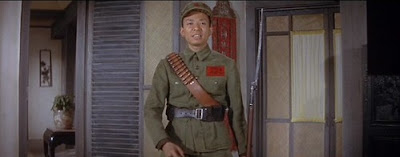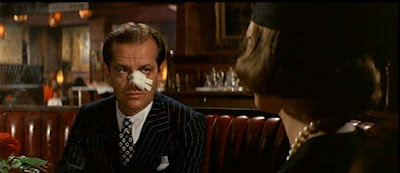Turning Red (Domee Shi, 2022) Meilin "Mei-Mei" Lee (Rosalie Chiang) is a precocious 13-year old living in the Toronto of 2002. Smart, even effervescent, she is a young adult on the cusp of change, a "tween" in every sense of the word. To her parents, Ming (Sandra Oh) and Jin (Orion Lee), she is a studious, obedient, respectful child, who is only too happy to excel at school, and forego her friends and outside activities to help with the family business, the temple dedicated to her ancestor Sun Yee. She is a credit to her family. But, there must be a debit somewhere. In her own words:
The number one rule in my family? Honor your parents. They're the supreme beings who gave you life who sweated and sacrificed so much to put a roof over your head, food on your plate, an epic amount of food. The least you can do in return is every single thing they ask. 'Course some people are like, Be careful. Honoring your parents sounds great, but if you take it too far, well, you might forget to honor yourself. Luckily, I don't have that problem. I'm Meilin Lee. And ever since I turned 13, I've been doin' my own thing, makin' my own moves; 24/7/365. I wear what I want, say what I want, and I will not hesitate to do a spontaneous cartwheel if I feel so moved!
At school, she is just as industrious...and spontaneous, invoking some envy and taunting from some school-mates, but never from from her posse of gal-pals, Miriam (Ava Morse), Priya (Maitreyi Ramakrishnan), and Abby (Hyein Park). The girls are like musketeers, unquestioningly loyal and all dedicated to the hero-worship of the boy-band, 4*Town (their songs provided by Billie Eilish and Finneas O'Connell), whose posters adorn their walls and their pre-pubescent minds and are just dreeeeeeeeeeeamy! (*squeeallllll!!!*)
But, despite the rock-solid priorities and the high SAT potentials there is one thing that is starting to crowd into her thoughts: boys. For example, the monosyllabic clerk at the Daisy Mart convenience store down the block, Devon. Mei-Mei ❤'s Devon, although this may be peer-perception because the rest of her squad ❤'s Devon. It's not Big-L Love, because it's more like merely emoji-love, but, still, in the privacy of her bed-room and her notebook, she starts doodling fantasy pictures of Devon and when Mom finds out, it is SO embarrassing.But it gets worse (it gets worse!!!) Mother Ming marches Mei down to the Daisey Mart and confronts the clueless clerk—she blames the clerk, not her little princess—for being a bad influence on her innocent daughter and she does it in front of "people"...and ❤Devon❤...and she could. just. DIE! And the next day, she has to go to school and EVERYBODY will know and it will be just one long humiliation only interrupted by school-bells. She. could. just. DIE. Instead, she has a nightmare involving warring factions in her brain—the temple, her family, and the boys NOT in her life. And she wakes up a giant red panda. You heard me. She wakes up a giant red panda. Seems that's the family curse, handed down on the matriarchal side, but Mei doesn't know that. All she knows it's she's a "big fat monster" and stinks of fur. Her horror attracts the attention of her Mother, who assumes it's another "curse" ("has the red peony bloomed?") and that Mei has had her first visit from "her little friend". Well, it ain't little. And it's no friend. And it's going to be SO inconvenient at school.Turning Red (the common phrase for "embarrassment") is not so much about Myth as about Metaphor. Oh, it's sneaky about it, hitting the nail squarely on the head a couple times...and kudos for doing so (hopefully, it'll spark some talk about "women's issues" at home), but creator Shi and her screenwriters, Julia Cho and Sarah Streicher, are talking about other issues beyond mere menstruation. Mei's ursinethropy may remind of "the monthly" but it's more about the hormonal transition from child to young adult, where you're taught to think, but not for yourself. Her transformations have nothing to do with estrogen, but, instead, from moments of high anxiety and high emotion.
This is bad timing for a teen-ager, but The Ancient Ones seemed to have known what they were doing—the pandification was given to Sun Yee in order that she might protect her family and village in times of conflict—as teens are nothing but conflict. Being the sharp tack that she is, Mei comes to learn that she can control her emotions, "zen out" and she transforms back into her original self....well, a ginger version of herself. Except, there's that "raging hormone" thing again...sometimes Mei just can't control herself. Life happens.And things happen in movies. The challenge in this involves timing and responsibility. On the one hand—the one where her friends are, their favorite band 4*Town is on tour and doing a date in Toronto. Problem? Mother Ming will NOT, absolutely NOT, allow Mei to go to the concert and will CERTAINLY not fork over the $100 bucks for a ticket (uh, remember, this is all taking place in 2002, so tickets did not bankrupt as they do today). No prob', Ming and her gal-pals will find a way. On the furry hand, the whole panda-rama can be taken care of, as it has for centuries, will a ceremony held on the occasion of a blood moon, where the panda spirit will be "re-located" to an amulet Mei will wear around her neck. It pays to accessorize.Does it all go according to plan? What do you think? We're talking teens here.
What DOES go well is Pixar. Director Shi won an Oscar for her hilarious, emotional but wonderfully off-beat short Bao, and here, she's just as precise in her comedy timing and her way of combining heart and hilarity, about the burdens of cultural expectation (and sub-textually, a woman's lot in life) like a Looney-Tunes Amy Tan novel. And she's hip enough that she throws in quick anime and emoji references that only "ups" the game and lowers the age-requirement for "getting" the wit. This is really good stuff.
But, despite the rock-solid priorities and the high SAT potentials there is one thing that is starting to crowd into her thoughts: boys. For example, the monosyllabic clerk at the Daisy Mart convenience store down the block, Devon. Mei-Mei ❤'s Devon, although this may be peer-perception because the rest of her squad ❤'s Devon. It's not Big-L Love, because it's more like merely emoji-love, but, still, in the privacy of her bed-room and her notebook, she starts doodling fantasy pictures of Devon and when Mom finds out, it is SO embarrassing.But it gets worse (it gets worse!!!) Mother Ming marches Mei down to the Daisey Mart and confronts the clueless clerk—she blames the clerk, not her little princess—for being a bad influence on her innocent daughter and she does it in front of "people"...and ❤Devon❤...and she could. just. DIE! And the next day, she has to go to school and EVERYBODY will know and it will be just one long humiliation only interrupted by school-bells. She. could. just. DIE. Instead, she has a nightmare involving warring factions in her brain—the temple, her family, and the boys NOT in her life. And she wakes up a giant red panda. You heard me. She wakes up a giant red panda. Seems that's the family curse, handed down on the matriarchal side, but Mei doesn't know that. All she knows it's she's a "big fat monster" and stinks of fur. Her horror attracts the attention of her Mother, who assumes it's another "curse" ("has the red peony bloomed?") and that Mei has had her first visit from "her little friend". Well, it ain't little. And it's no friend. And it's going to be SO inconvenient at school.Turning Red (the common phrase for "embarrassment") is not so much about Myth as about Metaphor. Oh, it's sneaky about it, hitting the nail squarely on the head a couple times...and kudos for doing so (hopefully, it'll spark some talk about "women's issues" at home), but creator Shi and her screenwriters, Julia Cho and Sarah Streicher, are talking about other issues beyond mere menstruation. Mei's ursinethropy may remind of "the monthly" but it's more about the hormonal transition from child to young adult, where you're taught to think, but not for yourself. Her transformations have nothing to do with estrogen, but, instead, from moments of high anxiety and high emotion.
This is bad timing for a teen-ager, but The Ancient Ones seemed to have known what they were doing—the pandification was given to Sun Yee in order that she might protect her family and village in times of conflict—as teens are nothing but conflict. Being the sharp tack that she is, Mei comes to learn that she can control her emotions, "zen out" and she transforms back into her original self....well, a ginger version of herself. Except, there's that "raging hormone" thing again...sometimes Mei just can't control herself. Life happens.And things happen in movies. The challenge in this involves timing and responsibility. On the one hand—the one where her friends are, their favorite band 4*Town is on tour and doing a date in Toronto. Problem? Mother Ming will NOT, absolutely NOT, allow Mei to go to the concert and will CERTAINLY not fork over the $100 bucks for a ticket (uh, remember, this is all taking place in 2002, so tickets did not bankrupt as they do today). No prob', Ming and her gal-pals will find a way. On the furry hand, the whole panda-rama can be taken care of, as it has for centuries, will a ceremony held on the occasion of a blood moon, where the panda spirit will be "re-located" to an amulet Mei will wear around her neck. It pays to accessorize.Does it all go according to plan? What do you think? We're talking teens here.
What DOES go well is Pixar. Director Shi won an Oscar for her hilarious, emotional but wonderfully off-beat short Bao, and here, she's just as precise in her comedy timing and her way of combining heart and hilarity, about the burdens of cultural expectation (and sub-textually, a woman's lot in life) like a Looney-Tunes Amy Tan novel. And she's hip enough that she throws in quick anime and emoji references that only "ups" the game and lowers the age-requirement for "getting" the wit. This is really good stuff.
In fact, the only quibble I have is that Disney chose—in their infinite attempts to keep Disney product in theaters and Pixar product on their streaming service—to only release it in L.A. and New York theaters for the shortest available time for Oscar consideration. This is a "Big-Screen" movie, the better to appreciate the artistry of the Pixar pixelators who worked so many months to get the details 'just so." Audiences would have clamored for it if it was available (despite the pearl-clutching of some Social Watchdogs).If anything, it should be Disney that is turning red.



















































